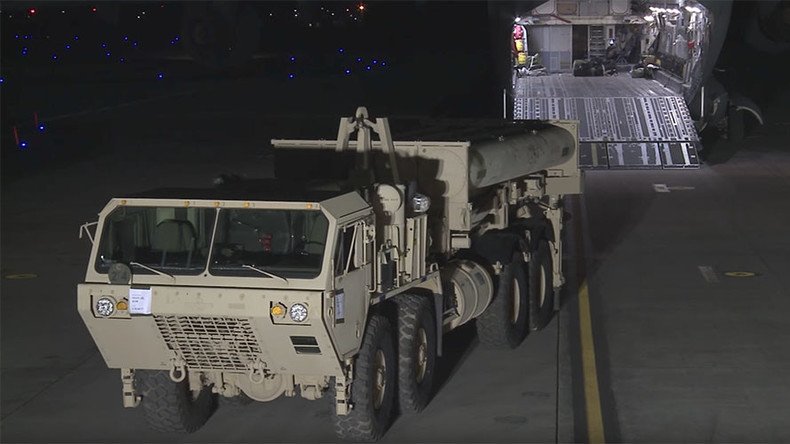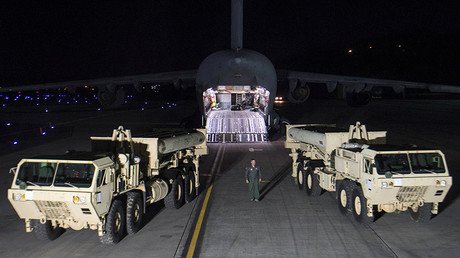S. Korean THAAD deployment faces delay of up to a year over environmental impact probe

Deployment of the US anti-missile system in South Korea is facing a setback after the new government ordered a full-scale environmental impact probe. President Moon Jae-in is a vocal critic of the previous government’s decision to host the THAAD system.
“The order to conduct an environmental impact assessment is a guideline to enhance the procedural legitimacy of the deployment, so the defense ministry will review ways to conduct such a study,” South Korean Defense Minister Han Min-koo said on Tuesday, as cited by Yonhap News Agency.
The probe may take up to a year and delay the ongoing deployment of the system, Yonhap says.
The probe is the latest step in the new South Korean government’s review of the controversial deal signed under the previous administration. The defense ministry allegedly used a number of legal loopholes to expedite the deployment of the US anti-missile system and shield it from public scrutiny.
One loophole, according to President Moon Jae-in’s office, is the partitioning of the land plot allocated for the Terminal High Altitude Area Defense (THAAD) system into two smaller ones. The ministry has agreed to provide a total of 690,000 square meters of land for the system, but has so far filed documents for only 320,000 square meters, the office said on Monday.
The reason is that under South Korean law, any deployment of equipment requiring more than 330,000 square meters of land must be subjected to a full-scale environmental impact assessment, while smaller projects only require a small informal test, presidential spokesman Cheong Wa Dae told reporters. Further transfers of land would be under the threshold as well, shielding the deployment from more rigorous scrutiny, the allegation goes.
Earlier, the presidential office accused the defense ministry of failing to report to President Moon the secret delivery of four additional THAAD launchers in addition to the two which were brought into the country publicly. Wee Seung-ho, deputy defense minister for policy, was relieved of duty for the omission and may face punitive measures.
The new government in Seoul suspects that the defense ministry was involved in an effort to make the THAAD deployment appear smaller than it actually is in the public eye. President Moon, who was elected in May after the previous government fell in a corruption scandal resulting in the impeachment of Park Geun-hye, pledged to make the project more transparent, including subjecting it to parliamentary approval.
READ MORE: China urges US to pull THAADs out of South Korea after secretive deployment
The anti-missile deal, which was signed under former US President Barack Obama, faced criticism in Washington as well, with President Donald Trump suggesting that Seoul should pay for it.
Uncertainty over THAAD was discussed during the Monday visit of US Vice Admiral James Syring, the director for the US Missile Defense Agency. Syring met Chung Eui-yong, head of the South Korean presidential National Security Office, as well as Gen. Vincent K. Brooks, commander of US Forces Korea, which is to operate the THAAD battery.
Chung Eui-yong assured the US military officials that the controversy surrounding the deployment was strictly about observing domestic legal procedures and would not affect the alliance between the two countries.
“Regarding the THAAD issue, [Chung] explained the country was conducting a review to secure democratic and procedural legitimacy, as well as transparency in its deployment,” the presidential office said in a statement, adding that the Americans “understood” the situation.













